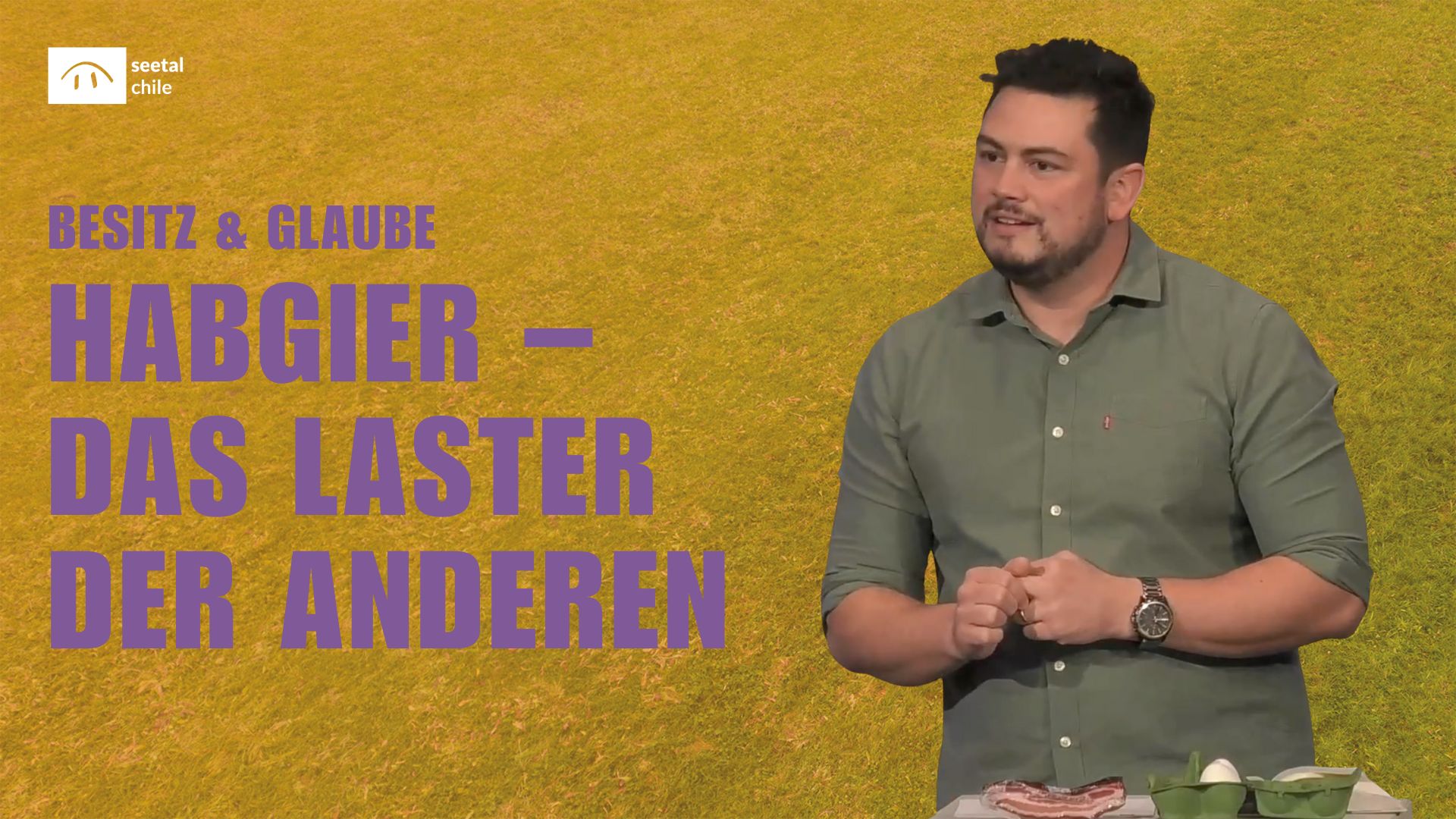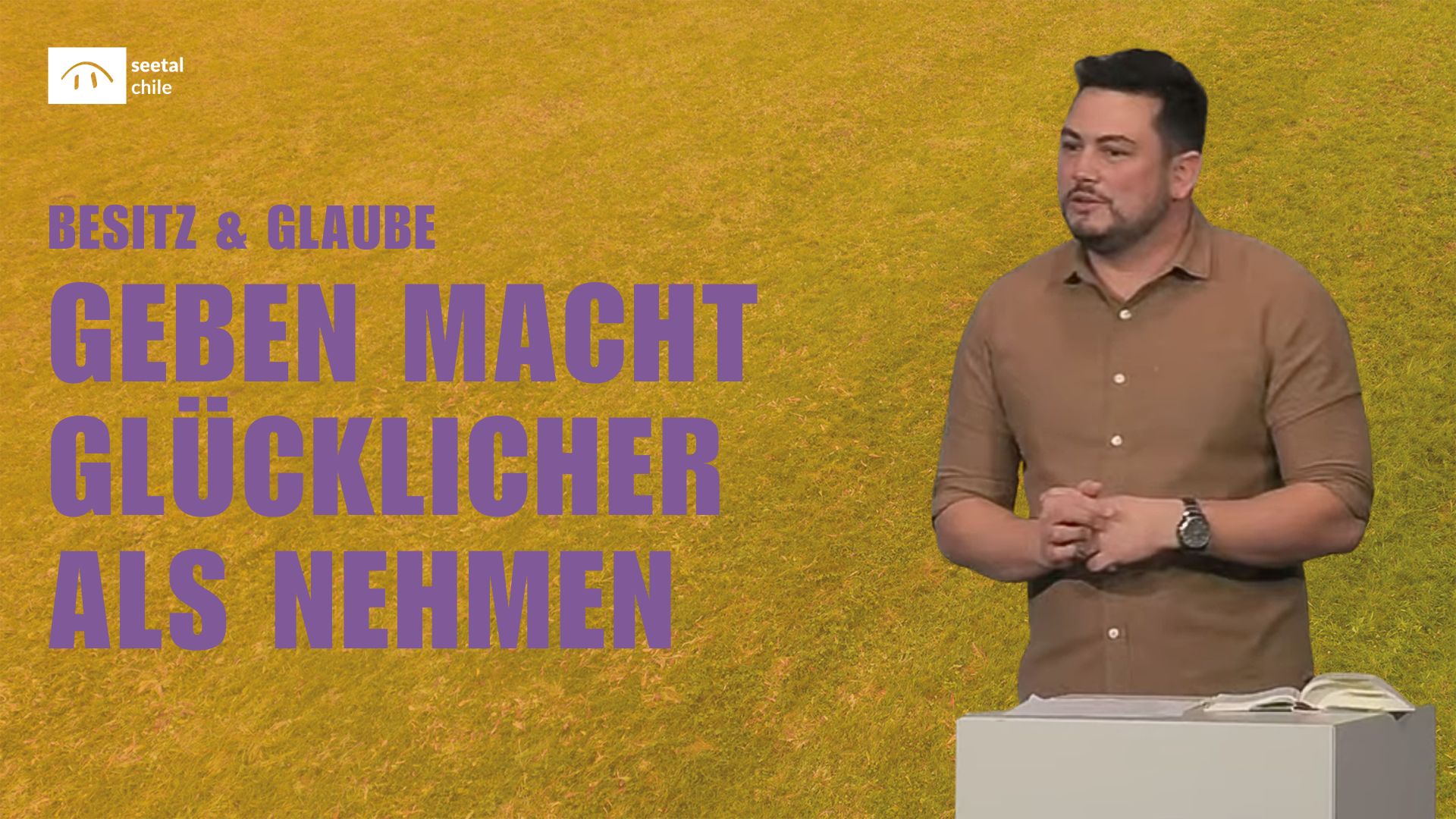Work & Faith | The Rhythm of God
Series: EIFACH muetig – with Jesus as a role model | Bible text: Genesis 2:1–3
The Sabbath is more than just a day off – it is a gift from God to rest, to take a break from everyday life and an expression of trust in Him. God himself rested after creation, and we too should experience this rest as a source of strength, orientation and a sign of dependence on God. Sabbath means consciously pausing, cultivating community and living work as worship, without the pressure of having to control everything ourselves. It is a counter-culture that characterises the way we live and work and creates space for joy, reflection and relationships.
Today we come to the crowning conclusion of the sermon series «Work & Faith». This is not about work itself, but about rest from work. In the Bible, this rest is described as the Sabbath. The Sabbath serves the rest of man and is a sign of trust in God.
Yesterday I learnt that I would be preaching the sermon today. That is why this Sabbath sermon is, on the one hand, less mature than other sermons, but on the other hand – like the Sabbath itself – it was born out of great trust in the work of God. Sabbath means: I cannot do everything myself, but you, God, work and accomplish it. I would like to start by asking you a question: When was the last time you really came to rest? When did you put your mobile phone aside, switch off Netflix, turn off the music and just sit down and «be»?
God himself rested
In the first sermon we saw that God is the author of labour. The dignity of labour lies in the fact that God himself has worked in creation. That is why our work becomes a form of worship to God. In the second part of the series, we dealt with the separation of God and human beings. God worked hard to redeem us from our sin, our missing the mark. In the area of work, this is particularly evident in the urge to make a name for ourselves, which is a great temptation to worship work rather than God.
This is exactly where the Sabbath comes in. God himself rested after the completion of creation: «So the creation of heaven and earth was completed, with everything that belongs to it. On the seventh day, God finished his work and rested from his labour» (Genesis 2:1–2 NLB). The noun behind «rest» is «Sabbath». The Sabbath is the seventh day of the week and a fixed time of rest. Why did God rest? Was he exhausted from his work of creation? No, certainly not. Resting always means allowing oneself to be interrupted. God rested after he had completed everything.
The seven-day rhythm is deeply rooted in us humans. After the French Revolution, a revolutionary calendar was introduced that symbolised the renunciation of the monarchy, nobles and the church. Instead of a seven-day week, they introduced a ten-day week, with only the tenth day being a day of rest. This led to less productivity as people were exhausted more quickly. As a result, it did not catch on and was eventually abolished.
The Sabbath, i.e. rest, is also important for us humans: «And God blessed the seventh day and declared it holy, because it was the day on which he rested from his work of creation» (Genesis 2:3 NLB). Holy here means being set apart from the rest – the focus is on God. The Sabbath acts as a counter to the urge to make a name for ourselves. If we allow ourselves to be interrupted, we are no longer in control of the outcome. At the same time, it is a counterbalance to social expectations: By upholding the day of rest, I show that I am not God. Rest, in turn, acts as a catalyst for how we approach our work. Corrie ten Boom, the Christian resistance fighter during the Second World War, aptly said: «If the devil can’t get you to sin, he’ll keep you busy» (Corrie ten Boom). In our everyday lives, the day often begins with sleep, followed by morning meal – if at all – and then work, followed by a break. The proverb «First the work, then the pleasure» (author unknown) shows that we often see performance first. Jewish thinking, on the other hand, is fascinatingly different: the day begins at sunset, starts with eating together, then sleep and after rest comes work.
The Sabbath is also a sign for the people of God: «Command the Israelites: Keep my Sabbaths [days of rest], for they are a sign of the everlasting covenant between me and you for all time. By this you shall know that I, the LORD, sanctify you» (Exodus 31:13 NLB). The day of rest shows that the people of Israel belong to God – holy means set apart.
Find peace
An interesting study by Loma Linda University, which examined tens of thousands of Seventh-day Adventists who strictly observe the Sabbath, shows that they live on average seven to ten years longer: That they live on average seven to ten years longer. The reasons for this are a healthy diet, health awareness, strong social networks and spiritual practices such as the Sabbath. The Sabbath acts as a protective element here: taking a break from work and stress promotes mental health, while spending time together with family, friends and the community strengthens social bonds. Loma Linda in California is the only «Blue Zone» in the USA – these «Blue Zones» are regions where people live remarkably long and healthy lives.
Sabbath means rest and a break from everyday life. Jesus Christ was firmly rooted in the Jewish faith and kept the Sabbath, but repeatedly clashed with the religious leaders over his interpretation. He said: «And he continued: «The Sabbath was made for the benefit of man and not man for the Sabbath. And therefore the Son of Man is Lord of the Sabbath!» (Mark 2:27–28 NLB). Jesus was attacking the Sabbath laws, but not the Sabbath as a day of rest itself. It is about rest, which is a gift from God to people – a gift that helps us to keep focussing on God.
The Sabbath is an expression of trust in God: allowing yourself to be interrupted shows that your whole life should be centred on God. Work is a form of worship, but the rest in between shows whether we really honour God with it. Work as worship includes the day of rest – we trust that it will turn out well, even if we are not on it every day. The Sabbath also acts as a counter-culture: when we are asked how we are doing, our answer is often: «Fine, just lots to do.» We define ourselves more by what we do than by what we are. However, more time is not the solution – it immediately fills up again. Work doesn’t become less if we allow ourselves to be interrupted, but it doesn’t become more either.
The Jewish Sabbath is preceded by the day of preparation. Preparation is important so that we can celebrate the Sabbath in peace and joy. So how do we organise our day of rest? Personal rules can help, depending on the type of person, but it is not about rigid adherence to rules. Something that I don’t do on my day of rest can be the epitome of a day of rest for others.
A few ideas and approaches: Don’t start resting when everything is done – then you’ll never get round to it. Bad things for the rest day are, for example, excessive media consumption, consumption in general, arguments or «just quickly…» – Things that can be postponed. Instead, fill the day with things that bring you joy and help you to be frugal: good food, good company, reflecting on the good things in life. For married people, sexuality is also part of the day of rest. As a family and as a couple, we try to consciously organise our Friday, even if we are still at the beginning of this journey. I switch off my mobile phone, we don’t consume any media and try to spend a lot of time together as a family. We read our Bibles together, pray together and cook a nice dinner that the four of us enjoy. That evening is also our marriage evening, which is just the two of us. Everything is not set in stone, but it serves as a guideline for our day of rest. And now the question for you: How could you organise your day of rest?
Possible questions for the small group
Read Bible text: Genesis 2:1–3; Mark 2:23–28
- When was the last time you really calmed down? What helped you or disturbed you?
- In which areas of your life do you find it difficult to let yourself be interrupted and trust God?
- How can you organise your everyday life so that work becomes worship without overburdening yourself?
- What social or personal expectations prevent you from taking regular rest breaks?
- What rituals or habits could help you to consciously organise a weekly rest day?
- How can the Sabbath strengthen your relationships with family, friends or church?




